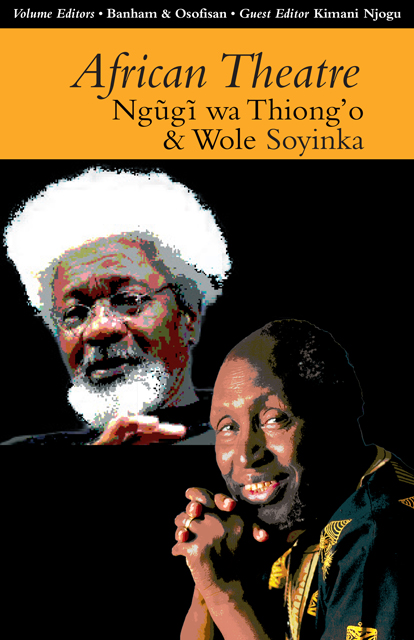Book contents
- Frontmatter
- Contents
- Notes on Contributors
- Obituary of Pat Amadu Maddy
- Introduction
- Reading & Performing African Drama: How Wole Soyinka & Ngũgĩ wa Thiong’o influenced my work
- Ayan Contra Ujamaa: Soyinka & Ngũgĩ as theatre theorists
- Encounters with Soyinka
- Encounters with Ngugi
- Wole Soyinka & Ngũgĩ wa Thiong’o: Plays in Production
- The Making of The Trial of Dedan Kĩmathi by Ngũgĩ wa Thiong’o & Mĩcere Gĩthae Mũgo at the University of California, Irvine: A personal reflection
- Playscript: A Rain of Stones
- Book Reviews
Book Reviews
Published online by Cambridge University Press: 23 February 2023
- Frontmatter
- Contents
- Notes on Contributors
- Obituary of Pat Amadu Maddy
- Introduction
- Reading & Performing African Drama: How Wole Soyinka & Ngũgĩ wa Thiong’o influenced my work
- Ayan Contra Ujamaa: Soyinka & Ngũgĩ as theatre theorists
- Encounters with Soyinka
- Encounters with Ngugi
- Wole Soyinka & Ngũgĩ wa Thiong’o: Plays in Production
- The Making of The Trial of Dedan Kĩmathi by Ngũgĩ wa Thiong’o & Mĩcere Gĩthae Mũgo at the University of California, Irvine: A personal reflection
- Playscript: A Rain of Stones
- Book Reviews
Summary
New Plays from Africa (all available from www.africanbookscollective.com)
Munyaradzi Mawere, Rain Petitioning and Step Child (Plays) Mankon, Bamenda: Langaa Research and Publishing Common Initiative Group, 2013 ISBN 978-9956-790-70-8, £15.95/$19.95
Rain Petitioning and Step Child is a collection of two plays. This first, Rain Petitioning, is made up of three scenes and each scene is divided into three stages. Although it has an interesting story, it is not a well-written piece as there is neither dramatic conflict nor character development. The dialogue is for the most part stilted; a fact made worse by many grammatical mistakes, some of this one feels is caused by the dramatist’s deployment of a local register and idiomatic expression. Added to its weakness as drama is a lack of sense of the play as a performance piece: it is filled often with unusual stage directions. The second play, Step Child, has some dramatic intrigue: the complicated background of Babamunini creates conflict as by custom he is entitled to inherit his biological father’s estate but is prevented by tradition from doing so as he had also been prevented from inheriting his step-home. But no resolution is offered in the end, with the play left in mid-action with Babamunini’s lament for his double loss. Step-Child also suffers from a similar poor use of English and weak character delineation.
Kelvin Ngong Toh, Fointama: A Play
Mankon, Bamenda: Langaa Research and Publishing Common Initiative Group, 2013 ISBN 978-9956-791-73-6, np
Fointama is the tragic love story of Fointama, the head of the hunters, and the Princess of Fuli, who naively colludes in him being framed and subsequently hanged for physically abusing the princess. But sub-textually, the play is about corruption in a land in which personal ambition overrides every other consideration and where morality is totally mortgaged to individual needs and schemes. There is a similarity between Kelvin Toh’s play and the plays in Bole Butake’s Dance of the Vampires and Six Other Plays as they are socially engaged plays which, although they use folktales and well-known parables, are concerned with the state of Cameroon. The princess, in love with Fointama and desperately hoping to rid herself of the unwanted love of Ayeah, the Prince of Belo, agrees to a plot to spread the rumour of Fointama’s abuse of the princess – an abomination punishable by death – only to see the latter hanged for the rumoured crime.
- Type
- Chapter
- Information
- African Theatre 13Ngugi wa Thiong'o and Wole Soyinka, pp. 110 - 128Publisher: Boydell & BrewerPrint publication year: 2014

